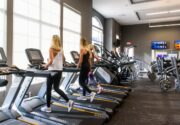Move more, sit less – fitness expert offers advice to stay on track with New Year’s resolutions
MU professor of nutrition and exercise physiology believes new federal guidelines on physical activity could help people move more
January 24th, 2019
The views and opinions expressed in this “for expert comment” release are based on research and/or opinions of the researcher(s) and/or faculty member(s) and do not reflect the University’s official stance.
COLUMBIA, Mo. – At the beginning of every year, gyms across the country are buzzing with new members who have made resolutions to lose weight, get back in shape or live a more active lifestyle. However, as the weeks go by, it can be challenging for some to stick to those resolutions.
Steve Ball, professor at the University of Missouri and one of the nation’s leading experts on fitness and exercise, says that for resolutions to stick, people need to focus not only on outcome goals, but also goals related to the process of being physically active.
Download broadcast-quality video related to this release.
“Too often people set fitness goals without a plan to get there,” Ball said. “Process goals, such as a commitment to working out three times a week, are more manageable for someone just starting out than outcome goals, such as wanting six-pack abs.”
Federal guidelines
New federal guidelines suggest that adults should aim for 150 minutes of moderate to vigorous physical activity each week, and any amount of time spent doing physical activity now counts toward the goal of active minutes. Prior guidelines had called for at least 10 minutes of activity for it to count.
“Adults should remember that daily exercise does not have to be done in one setting,” Ball said. “When it comes to exercise, some always is better than none; more is better than some and too much is difficult to get.”
Ball’s advice makes sense to Donna Fox of Columbia, Missouri. Fox recently joined a CrossFit gym and attends classes five to six times a week. While she might consider herself a “gym rat” now, that wasn’t always the case. Fox grew up in the Caribbean and never set foot in a gym until she moved to Missouri and had children. She is happy about the progress she has made since becoming more active and feels healthier and happier working out, even though she still would like her stomach to be a little flatter.
Ball says attending classes is a great way to hold yourself accountable. However, he notes that physical activity does not need to be measured or considered “exercise” to be beneficial.
“Being physically active doesn’t need to require a huge commitment or a lot of time in the gym,” he said. “Sometimes it can be as simple as taking the stairs instead of the elevator or parking farther away than normal.”
Four tips stay on track with resolutions
Ball provides the following tips to help people with their fitness goals throughout the year:
- Don’t skip physical activity. Even finding small ways to fit in moving, including scheduling a walk, completing household chores or finding time in the mornings for physical activity, can be helpful in staying on track with goals and resolutions.
- Ask for help. Too often people set goals and then don’t have the knowledge or expertise to figure out a plan to achieve them. This can lead to frustration. Ball encourages beginners to seek out a class, trainer or program where they can seek advice and best practices.
- Lean on a friend. Working out with a friend, partner or even a child can keep a person on track. Accountability can be a major motivator to keep people going after the initial excitement of a resolution wears off. Encouraging active play with children also is a critical step in helping children as young as 3 years old establish good health habits.
- Recognize that barriers exist. Plan activities in advance, which can help when “life gets in the way.” For example, when Ball travels, he scouts the area for local gyms and parks and is sure to know when obligations are scheduled so that he can schedule around those events.
Ball also serves as the state fitness specialist for MU Extension. The MU Department of Nutrition and Exercise Physiology is jointly administered by the College of Agriculture, Food and Natural Resources, the College of Human Environmental Sciences and the School of Medicine.



 Photo:
Photo: